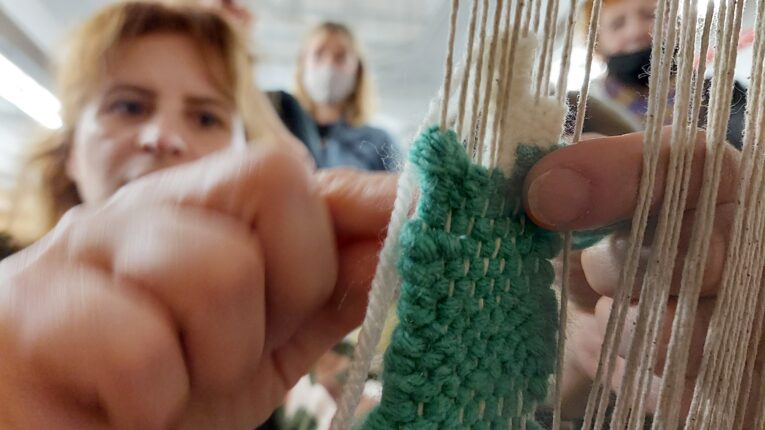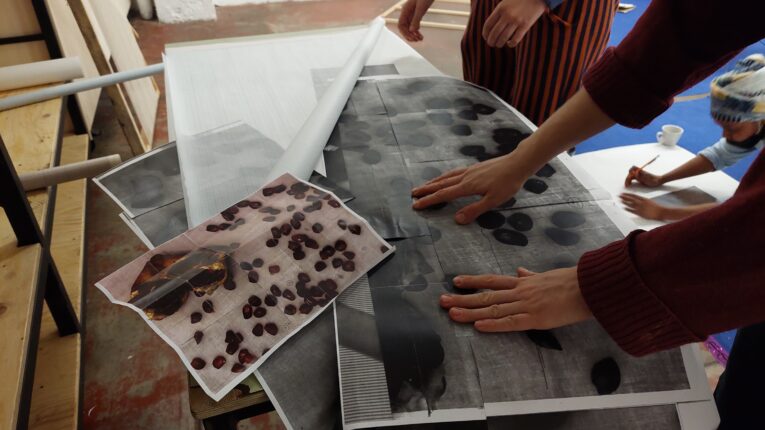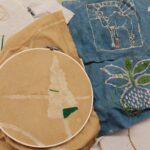ESPACE FXMME * GETTING SOFTER
GETTING SOFTER, is a series of workshops on different textile techniques that took place every Thursday, aiming to create literally a softer space. Since April 2021, the group has been designing a series of patchwork curtains.
The series of patchwork curtains are used both in Globe Aroma, to create a softer and more fluid space, as well as in the public sphere and in art institutions, to host a safe and more intimate nomadic environment of exchange for women.
Six curtains have been created following different themes that were based on brainstorming sessions held by the community of Espace Fxmme. The themes that the women have talked about so far in their creations are: “nature, mountains, and animals”, “freedom”, “family and home”, “motherhood and childhood”, and “motherland and origins”.
with the support of Welzijnszorg
Workshop leaders * Golnesa Rezanezhad, artistic coordinator and patchwork artist, Salomé Grdzelischvili, weaving artist, Rae Sita Pratiwi, Indonesian batik guru, Ramzi Hassan and Jamileh Ahmadzi, Afghan embroidery experts.
Espace Fxmme creation team * Anna Housiada, Shilemeza Prins, Mimouna Amri, Hafize Azimi, Shorena Noniashvili, Elli Vassalou, Ifrah Yusuf, Salimata Conde, Jasmien De Ryck, Clara de Vos.
Workshop contributors * Mirra Markhaeva, Sahra Abdikarin, Taziri Alomrani, Soumaya Mahroug, Kaatje Vermeiren, Mona Cornelis, Joan Somers Donnely, Larisa Utesheva, Maria Muehombo, Zam Zadeh, Pascale Felten, Bruna Esperi, Barbara Prada, Latifa, Christina Phoebe, Stelios Vassalos, Deborah Williams and more.
Pattern design and patchwork workshops with Golnesa Rezanezhad
Golnesa is a multi-disciplinary visual artist and researcher. Her work embraces a wide spectrum of practises from drawing, painting, weaving, patchworking to video installation. She is interested in bringing everyday objects and crafting skills, part of people’s material culture, into her practice, next to gestures to modern life metaphors. Through objects, ornaments and different types of textile, she adds individual and collective stories, memories, or emotional affinities into artistic work. Her work shifts from personal and individual to the bigger collective social and political condition.
Through her feminist approach and collaborative methods, she
converts a self-reflection (of an artist) to the collective-reflection (of a group of people) in the artwork. Through the involvement of her participants’ skills and material cultures, she examines the notion of culture and cultural diversity after modernism and with immigration surging waves in postmodernism. In this relation, the spatial claim and locational identity about land, institutional space, and public space is also her concern and part of the challenge that her works offer.
Weaving workshops met Salomé Grdzelischvili
Batik workshops met Rae Sita Pratiwi
Batik is an Indonesian traditional craft where one can draw motifs and patterns using wax on cotton fabric. It is a reflection of forgotten times, spaces and identities.
Rae uses Batik as a way to not forget her roots and culture. As a foreigner living in Belgium, the questions on identity are always something intriguing for her. Personal identity by definition is a concept one develops about oneself throughout life. Thus may include the aspect of life that one has no control over, such as where they grew up, the language they speak, or the colour of their skin, as well as choices they make in life, such as how to spend time and what one believes. Rae holds thematic artistic, cultural and creative workshops using collaborative approaches and participatory processes. Engaging people in different ways of communication to reach a common ground is always an exciting challenge for her. Storytelling methods, cadaver exquisite, incorporated during the workshop generate ideas through texts and visuals from the participants. Later on, the material created will form the basis for the Batik patterns.
Afghan embroidery with Ramzi Hassan, Samineh
Hamdard & Jamileh Ahmadzi
Embroidery in Afghanistan and southern Iran has been one of the important art forms. Women, mainly, learn this art from their mothers and pass it on to the next generation. They embroider different pieces of fabrics to decorate their homes and design clothes. Every child born in Afghanistan possess pieces of embroidery which are giftedto them by female relatives. In Afghanistan embroidery is also taught in schools to girls students. In recent decades, many fashion designers have inspired and applied these regional embroidery techniques to their designs.
Now they are invited to collaborate in the Espace Fxmme project: GETTING SOFTER with other women textile artists, creating safer and softer vessels of hospitality for the community of Globe Aroma.
















